| Listing 1 - 10 of 12 | << page >> |
Sort by
|
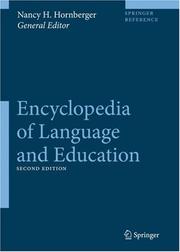
ISBN: 9780387328751 9789048194001 Year: 2008 Publisher: New York, N.Y. Springer
Abstract | Keywords | Export | Availability | Bookmark
 Loading...
Loading...Choose an application
- Reference Manager
- EndNote
- RefWorks (Direct export to RefWorks)
Research on teaching --- Didactics of languages --- Taal en talen --- Taalonderwijs --- research --- methodologie. --- Language and education --- Langage et éducation --- Encyclopedias --- Encyclopédies --- EPUB-LIV-FT LIVEDUCA SPRINGER-B
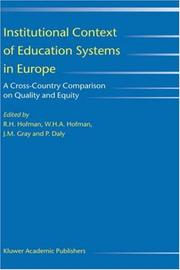
ISBN: 1402027443 1402027451 9781402027451 Year: 2005 Publisher: Dordrecht Springer Science + Business Media, Inc.
Abstract | Keywords | Export | Availability | Bookmark
 Loading...
Loading...Choose an application
- Reference Manager
- EndNote
- RefWorks (Direct export to RefWorks)
Based on empirical analysis using configuration theory and multi-dimensional scaling, this book provides insight into types of relationships that can be found between groups of countries with certain institutional context features, and into the quality and equity of their education system. In this volume, the authors take up the challenge of considering what a European settlement' might look like. In doing so, they take into account worldwide trends and the increasing evidence of convergence across educational systems. The outcomes of comparative analyses seem to suggest that strong education systems in terms of finance, governance and choice could be preferable. To a greater or lesser extent, therefore, all the systems of education currently in use in Europe face some common challenges. The way in which these challenges are addressed will determine the future of these systems. Key elements in the current debate that are considered in greater detail in this volume include changing views on (a) centre-local relations with signs of an increasing commitment to decentralisation as a guiding principle for developing school governance; (b) school autonomy which is now increasingly regarded as the engine-room for school improvement, especially in relation to sustaining it; and (c) the celebration of community and school choice as a means of securing higher levels of parental involvement. This volume will be of interest to researchers and practitioners working in education, educational research and sociology of education. It will also be of relevance to those interested in the comparison of various education systems and in governance, funding of education and school choice.
School management --- Teaching --- onderwijs --- Europe --- Education --- Schools --- Education and state --- School management and organization --- Ecoles --- Administration scolaire --- Politique gouvernementale --- EPUB-LIV-FT LIVEDUCA SPRINGER-B

ISBN: 1402027443 1402027451 9781402027451 9786610190164 1280190167 Year: 2004 Publisher: Dordrecht : Kluwer,
Abstract | Keywords | Export | Availability | Bookmark
 Loading...
Loading...Choose an application
- Reference Manager
- EndNote
- RefWorks (Direct export to RefWorks)
Based on empirical analysis using configuration theory and multi-dimensional scaling, this book provides insight into types of relationships that can be found between groups of countries with certain institutional context features, and into the quality and equity of their education system. In this volume, the authors take up the challenge of considering what a European ‘settlement’ might look like. In doing so, they take into account worldwide trends and the increasing evidence of convergence across educational systems. The outcomes of comparative analyses seem to suggest that strong education systems in terms of finance, governance and choice could be preferable. To a greater or lesser extent, therefore, all the systems of education currently in use in Europe face some common challenges. The way in which these challenges are addressed will determine the future of these systems. Key elements in the current debate that are considered in greater detail in this volume include changing views on (a) centre-local relations with signs of an increasing commitment to decentralisation as a guiding principle for developing school governance; (b) school autonomy which is now increasingly regarded as the engine-room for school improvement, especially in relation to sustaining it; and (c) the celebration of community and school choice as a means of securing higher levels of parental involvement. This volume will be of interest to researchers and practitioners working in education, educational research and sociology of education. It will also be of relevance to those interested in the comparison of various education systems and in governance, funding of education and school choice.
School management --- Teaching --- onderwijs --- Europe --- Education. --- International education . --- Comparative education. --- Education, general. --- International and Comparative Education. --- Education --- Schools --- Education and state --- School management and organization --- Ecoles --- Administration scolaire --- Politique gouvernementale --- EPUB-LIV-FT LIVEDUCA SPRINGER-B --- Education, Comparative --- Global education --- Intellectual cooperation --- Internationalism --- Children --- Education, Primitive --- Education of children --- Human resource development --- Instruction --- Pedagogy --- Schooling --- Students --- Youth --- Civilization --- Learning and scholarship --- Mental discipline --- Training --- History
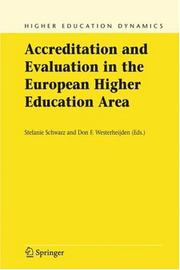
ISBN: 1402055374 9781402055379 1402027966 9781402027963 1402027974 1280190760 9786610190768 1280940573 9786610940578 Year: 2007 Volume: 5 Publisher: Dordrecht Springer
Abstract | Keywords | Export | Availability | Bookmark
 Loading...
Loading...Choose an application
- Reference Manager
- EndNote
- RefWorks (Direct export to RefWorks)
This volume presents a rich account of the development of accreditation and evaluation in 20 European countries. The authors are leaders in the field and they have cooperated in this effort by writing richly different, often deep and insightful analyses of the situation in their country. The two editors have added a synopsis detailing the main trends, and sketching commonalities as well as contrasts in the developments across Europe. The book shows how accreditation is becoming a main mechanism in the steering of higher education all over Europe. The book is unique in its analysis of forces driving towards the spread of different models of accreditation in the emerging European Higher Education area. Readers will obtain an up-to-date picture of the state of affairs of accreditation in the framework of evaluation activities in Europe. They will gain an understanding of why accreditation and evaluation systems have evolved the way they have, and subsequently, they will obtain more realistic views on potentialities for European comparability and cooperation in this area.
#SBIB:316.334.1O211 --- Onderwijsbeleid: internationaal --- Accreditation --- Agrément --- 378.1 --- 371.2 Schoolorganisatie --- 378.1 Interne organisatie. Universitaire autonomie --- Interne organisatie. Universitaire autonomie --- Agrément --- EPUB-LIV-FT LIVEDUCA SPRINGER-B --- Education. --- International education. --- Comparative education. --- Assessment. --- Higher education. --- Higher Education. --- International and Comparative Education. --- Assessment, Testing and Evaluation. --- 371.2 --- Schoolorganisatie --- School management --- Higher education --- Europe --- Universities and colleges --- Education, Higher --- Evaluation. --- Universités --- Enseignement supérieur --- Evaluation --- Education, Higher. --- Educational tests and measuremen. --- International education . --- Education, Comparative --- Education --- Global education --- Intellectual cooperation --- Internationalism --- College students --- Postsecondary education --- History --- Colleges --- Degree-granting institutions --- Higher education institutions --- Higher education providers --- Institutions of higher education --- Postsecondary institutions --- Public institutions --- Schools
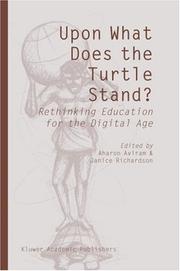
ISBN: 1402027982 9786610190775 1280190779 1402027990 Year: 2005 Publisher: New York : Kluwer Academic Publishers,
Abstract | Keywords | Export | Availability | Bookmark
 Loading...
Loading...Choose an application
- Reference Manager
- EndNote
- RefWorks (Direct export to RefWorks)
This book brings together the reflections of independent researchers from around the world. Sixteen authors from fourteen countries present their views on the use of information and communication technology (ICT) in education, offering valuable insights through the examination of current issues relevant to the future of education. What will education be in tomorrow’s world? How can ICT be used without rendering education a purely technical process? How can we succeed the renovation of educational subjects without transforming them into technical objects? The introductory chapter of this publication guides us into the essays through a classification organized by the editors to illustrate different attitudes to technologies: • The ‘Globalizers’ see the integration of ICT and education as a means of enhancing the competitiveness of their society in a global economy; • The ‘Reformists’ see it as a means of bringing about significant change in didactics in the various disciplines, and even in the ‘basics’ of education; • The ‘Humanists’ consider technologies as possible catalysts for changing the aims and values of education from learni- oriented to humanistic; • The ‘Heretic’ sees values and aims as being determined exclusively by technology, and economy and culture as s- products of the technology-guided process. He therefore does not see any sense in interrogations as to which aims should guide us in integrating technology with education. Obviously, some arguments stretch across all four categories without completely matching any so-called type.
Computer-assisted instruction. --- Education --- Educational innovations --- Enseignement assisté par ordinateur --- Enseignement --- Data processing. --- Aims and objectives --- Informatique --- Innovations --- Finalités --- EPUB-LIV-FT LIVEDUCA SPRINGER-B --- Computer uses in education --- Computers in education --- Educational computing --- Microcomputer uses in education --- Microcomputers in education --- Education. --- Children --- Education, Primitive --- Education of children --- Human resource development --- Instruction --- Pedagogy --- Schooling --- Students --- Youth --- Civilization --- Learning and scholarship --- Mental discipline --- Schools --- Teaching --- Training --- Education, general. --- Educational Technology. --- Educational Philosophy. --- Philosophy. --- Educational technology. --- Education—Philosophy. --- Instructional technology --- Technology in education --- Technology --- Instructional systems --- Aids and devices
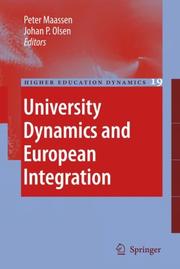
ISBN: 9781402059704 1402059701 9048174929 9786610959976 1280959975 140205971X Year: 2007 Volume: 19 Publisher: Dordrecht : Springer,
Abstract | Keywords | Export | Availability | Bookmark
 Loading...
Loading...Choose an application
- Reference Manager
- EndNote
- RefWorks (Direct export to RefWorks)
The European University is under stress. It has become commonplace to argue that radical reforms are needed. The claim is that while environments are changing rapidly, European universities do not learn, adapt and reform themselves fast enough. Reform plans comprise the purposes of universities, i.e. definitions of what the University is, can be and should be, criteria for quality and success, the kinds of research, education., services and innovation to be produced, and for whom. Reform plans also include the universities’ organization and financial basis, their governance structures, who should influence the future dynamics of universities, and according to what principles. In contrast, it can be argued that the currently dominant reform rhetoric is only one among several competing visions and understandings of the University and its dynamics. What is at stake is "what kind of University for what kind of society" and which, and whose values, interests and beliefs should be given priority in University governance and reforms? This book explores the visions underlying the attempts to reform the European University as well as two European integration processes ("Bologna" and "Lisbon") affecting University dynamics. Above all, the book presents a framework for analyzing ongoing "modernization" reforms and reform debates that take place at various governance levels, not least the European level, and a long-term research agenda.
Higher education and state --- Education --- Enseignement supérieur --- Political aspects --- Politique gouvernementale --- Aspect politique --- Education. --- Higher education and state. --- Education, Special Topics --- Theory & Practice of Education --- Social Sciences --- #SBIB:316.334.1O211 --- Onderwijsbeleid: internationaal --- Enseignement supérieur --- EPUB-LIV-FT LIVEDUCA SPRINGER-B --- Children --- Education, Primitive --- Education of children --- Human resource development --- Instruction --- Pedagogy --- Schooling --- Students --- Youth --- Political science. --- Educational policy. --- ducation and state. --- Higher education. --- Higher Education. --- Political Science. --- Educational Policy and Politics. --- Education and state. --- College students --- Higher education --- Postsecondary education --- Universities and colleges --- Education policy --- Educational policy --- State and education --- Social policy --- Endowment of research --- Administration --- Civil government --- Commonwealth, The --- Government --- Political theory --- Political thought --- Politics --- Science, Political --- Social sciences --- State, The --- Civilization --- Learning and scholarship --- Mental discipline --- Schools --- Teaching --- Training --- Government policy --- Education, Higher.
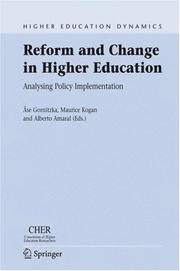
ISBN: 1402055366 9781402055362 1402034024 9781402034022 1402034113 9786610283835 1280283831 Year: 2007 Volume: 8 Publisher: Dordrecht Springer
Abstract | Keywords | Export | Availability | Bookmark
 Loading...
Loading...Choose an application
- Reference Manager
- EndNote
- RefWorks (Direct export to RefWorks)
Starting from the now classical book by Ladislav Cerych and Paul Sabatier (1986), the editors present a critical appreciation of that initial work and a review and critical appraisal of current empirical policy research in higher education. In the second part, a set of chapters analyses the effective and specific complexities of the implementation of higher education policies in several countries, offering a wide variety of situations both in terms of duration of implementation, legal objectives, adequacy of causal theories underlying the reforms, adequacy of financial resources and degree of commitment of the main actors of the process. Some of these chapters use alternative theoretical frameworks developed since the 1986 Cerych and Sabatier theorization to interpret the empirical results, and some national cases do not fall within the scope of Cerych and Sabatier’s analysis. The national case studies are: Australia (2), Austria, Finland, Italy, Mexico, The Netherlands, Norway, Portugal, Spain, South Africa, Sweden, the UK and the USA.
#SBIB:316.334.1O212 --- Onderwijsbeleid: nationaal --- Educational change -- Congresses. --- Higher education and state -- Congresses. --- EPUB-LIV-FT LIVEDUCA SPRINGER-B --- Education. --- International education. --- Comparative education. --- Educational policy. --- ducation and state. --- Educational sociology. --- Education and sociology. --- Sociology, Educational. --- Educational Policy and Politics. --- Sociology of Education. --- International and Comparative Education. --- Education and state. --- Education and sociology --- Social problems in education --- Society and education --- Sociology, Educational --- Sociology --- Education --- Education policy --- Educational policy --- State and education --- Social policy --- Endowment of research --- Education, Comparative --- Global education --- Intellectual cooperation --- Internationalism --- Children --- Education, Primitive --- Education of children --- Human resource development --- Instruction --- Pedagogy --- Schooling --- Students --- Youth --- Civilization --- Learning and scholarship --- Mental discipline --- Schools --- Teaching --- Training --- Aims and objectives --- Government policy --- History --- Higher education and state --- Educational change --- Education, Higher --- Enseignement supérieur --- Enseignement --- Administration --- Politique gouvernementale --- Réforme --- International education .
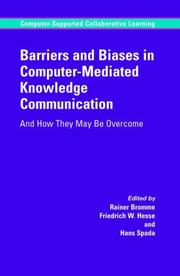
ISBN: 0387243178 144193720X 9786610263363 1280263369 0387243194 Year: 2005 Volume: v. 5 Publisher: New York, NY : Springer,
Abstract | Keywords | Export | Availability | Bookmark
 Loading...
Loading...Choose an application
- Reference Manager
- EndNote
- RefWorks (Direct export to RefWorks)
This books deals with computer-mediated cooperation and communication scenarios in teaching and learning situations, leisure activities (e.g. laypersons looking for expert information on the internet), and net-based communication at work. Such scenarios will become increasingly important. But the successful use of such computer-mediated settings is not trivial. Cooperative learning and work itself requires special skills and strategies. And the technical settings with sometimes restricted, sometimes new possibilities for communication add problems on top of the cooperation itself. What are the barriers in computer-mediated communication for cooperative learning and work? Which are the most relevant biases in computer-mediated information processing? Based on empirical research the contributors from psychology, education and computer sciences offer different perspectives on the nature and causes of such barriers. The chapters also give an answer to the question how it might be possible to overcome these barriers and biases to fully gain advantage from the new technical opportunities. These results and answers are of interest for students as well as for researchers in all fields related to the use and evaluation of computer software in communication settings.
Computer-assisted instruction. --- Knowledge acquisition (Expert systems) --- Enseignement assisté par ordinateur --- Acquisition des connaissances (Systèmes experts) --- Computer-assisted instruction --- Education --- Social Sciences --- Education, Special Topics --- Theory & Practice of Education --- Enseignement assisté par ordinateur --- Acquisition des connaissances (Systèmes experts) --- EPUB-LIV-FT LIVEDUCA SPRINGER-B --- Acquisition, Knowledge (Expert systems) --- Expertise acquisition (Expert systems) --- CAI (Computer-assisted instruction) --- Computer-aided instruction --- Computer-assisted learning --- Computer based instruction --- Computer-enhanced learning --- Electronic data processing in programmed instruction --- ILSs (Integrated learning systems) --- Integrated learning systems --- Microcomputer-aided instruction --- Microcomputer-assisted instruction --- Microcomputer-assisted learning --- Microcomputer-based instruction --- Teaching --- Data processing --- Education. --- User interfaces (Computer systems). --- Educational technology. --- Personality. --- Social psychology. --- Educational Technology. --- User Interfaces and Human Computer Interaction. --- Education, general. --- Learning & Instruction. --- Personality and Social Psychology. --- Expert systems (Computer science) --- Educational technology --- Programmed instruction --- Telematics --- Computer science. --- Consciousness. --- Apperception --- Mind and body --- Perception --- Philosophy --- Psychology --- Spirit --- Self --- Informatics --- Science --- Children --- Education, Primitive --- Education of children --- Human resource development --- Instruction --- Pedagogy --- Schooling --- Students --- Youth --- Civilization --- Learning and scholarship --- Mental discipline --- Schools --- Training --- Learning. --- Instruction. --- Mass psychology --- Psychology, Social --- Human ecology --- Social groups --- Sociology --- Personal identity --- Personality psychology --- Personality theory --- Personality traits --- Personology --- Traits, Personality --- Individuality --- Persons --- Temperament --- Learning process --- Comprehension --- Interfaces, User (Computer systems) --- Human-machine systems --- Human-computer interaction --- Instructional technology --- Technology in education --- Technology --- Educational innovations --- Instructional systems --- Aids and devices
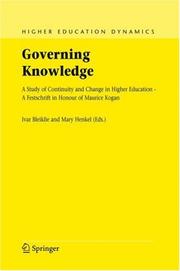
ISBN: 140203489X 1402035047 9781402034893 9048168821 9786610284108 1280284102 Year: 2005 Volume: 9 Publisher: Dordrecht Springer
Abstract | Keywords | Export | Availability | Bookmark
 Loading...
Loading...Choose an application
- Reference Manager
- EndNote
- RefWorks (Direct export to RefWorks)
In this book, an international group of leading higher education researchers draw on a wealth of social theory and comparative, empirical research to analyse current developments and their implications. Different contributions focus on different levels of higher education, the system, the institution and the academic practitioner, in different national and international contexts. However, strong common themes bind these contributions together. They include not only the significance of massification, globalisation, neo-liberalism and managerialism for the governance of higher education, its knowledge and values, but also the complexities of change processes, the importance of context and history and the strength of the stabilities that remain. The inspiration for this work comes from the career and personal influence of an individual scholar, Maurice Kogan. A central feature of his work has been empirically grounded analysis of interconnections between knowledge, values, authority and power and how these are reflected in institutional structures and individual practices. As a historian as well as a political scientist, he has always insisted on locating contemporary developments in a longer term perspective. This volume is for researchers in higher education studies, students in postgraduate courses in higher education policy and management, higher education policy makers in national and international organisations, higher education institutional leaders, senior academics, managers and administrators. Professor Teboho Moja, New York University, USA: "It will be an invaluable resource inter alia for higher education students, scholars, and institutional leadership." "The book could provide a major contribution to the field of higher education because of the different perspective different authors present and an array of issues as well as frameworks to discuss them." "This book is bound for the desktops instead of the bookshelves of administrators, researchers, and graduate students. It is likely to be used time and again as readers explore new ways to transform education systems or institutions, meet their needs for program improvement, policy development, and general research. I expect that most readers will weave through the chapters (...) on an as-needed basis, until they have engaged all its excellent content.".
Education, Higher --- Higher education and state --- Educational change. --- Enseignement supérieur --- Enseignement --- Research --- Recherche --- Politique gouvernementale --- Réforme --- Kogan, Maurice. --- #SBIB:316.334.1O210 --- #SBIB:316.334.1O220 --- Onderwijsbeleid: algemeen --- Organisatie van het onderwijs: algemeen --- Education, Higher. --- Education. --- Higher education and state. --- Education --- Social Sciences --- Theory & Practice of Education --- Universities and colleges --- Knowledge management. --- Administration. --- Aims and objectives. --- Enseignement supérieur --- Réforme --- EPUB-LIV-FT LIVEDUCA SPRINGER-B --- Management of knowledge assets --- Educational administration --- College students --- Higher education --- International education. --- Comparative education. --- Educational policy. --- ducation and state. --- Higher education. --- Higher Education. --- International and Comparative Education. --- Educational Policy and Politics. --- Education, general. --- Education and state. --- Postsecondary education --- Education policy --- Educational policy --- State and education --- Social policy --- Endowment of research --- Education, Comparative --- Global education --- Intellectual cooperation --- Internationalism --- Children --- Education, Primitive --- Education of children --- Human resource development --- Instruction --- Pedagogy --- Schooling --- Students --- Youth --- Civilization --- Learning and scholarship --- Mental discipline --- Schools --- Teaching --- Training --- Government policy --- History --- Educational change --- State and higher education --- Education and state --- Change, Educational --- Education change --- Education reform --- Educational reform --- Reform, Education --- School reform --- Educational planning --- Educational innovations --- Management --- Information technology --- Intellectual capital --- Organizational learning --- University autonomy --- International education .
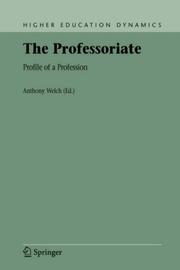
ISBN: 1402033826 1402033834 9781402033827 9786610283811 1280283815 Year: 2005 Volume: 7 Publisher: Dordrecht Springer
Abstract | Keywords | Export | Availability | Bookmark
 Loading...
Loading...Choose an application
- Reference Manager
- EndNote
- RefWorks (Direct export to RefWorks)
What does it mean to be an academic in the twenty first century? Clearly, there is no one answer to this question, as the diversity evident in the following chapters reveals. Elite research universities often tend to join with others of their kind, so that a professor from an elite US institution may well undertake a Japanese sabbatical (if at all) at the University of Tokyo, a UK semester at Oxford or Cambridge, or an Australian semester at the University of Sydney, or perhaps Melbourne. At each, they can expect to have at their disposal well-stocked libraries, replete with requisite books, journals and databases, (many now available electronically), as well as highly regarded specialist peers in their research areas, with whom they can discuss their work in detail. How can this academic lifeworld be compared with that of a member of the South East Asian professoriate, for example, or many in Latin America and Africa, where inadequate wages often necessitate taking on a second job, often at a lower quality private institution (which, however, likely offers better remuneration), and/or perhaps conducting a small business on the side (Welch 2003, Tipton, Jarvis and Welch 2003), and where the lack of basic infrastructure, as well as research training, means that teaching, and perhaps some administration, is perhaps the limit of one’s activities? The story of differentiation, however, is not limited todifferences between elite institutions in OECD countries and more modest institutions elsewhere.
College teaching. --- College teachers. --- Enseignement universitaire --- Professeurs (Enseignement supérieur) --- #SBIB:316.334.1O277 --- Onderwijs: rol van het personeel: hoogleraar --- College teaching --- College teachers --- Education --- Social Sciences --- Theory & Practice of Education --- Professeurs (Enseignement supérieur) --- EPUB-LIV-FT LIVEDUCA SPRINGER-B --- Academicians --- Academics (Persons) --- College instructors --- College lecturers --- College professors --- College science teachers --- Lectors (Higher education) --- Lecturers, College --- Lecturers, University --- Professors --- Universities and colleges --- University academics --- University instructors --- University lecturers --- University professors --- University teachers --- University teaching --- Teachers --- Education. --- International education. --- Comparative education. --- Educational policy. --- ducation and state. --- Educational sociology. --- Higher education. --- Education and sociology. --- Sociology, Educational. --- Higher Education. --- International and Comparative Education. --- Sociology of Education. --- Educational Policy and Politics. --- Education and state. --- Education and sociology --- Social problems in education --- Society and education --- Sociology, Educational --- Sociology --- College students --- Higher education --- Postsecondary education --- Education policy --- Educational policy --- State and education --- Social policy --- Endowment of research --- Education, Comparative --- Global education --- Intellectual cooperation --- Internationalism --- Children --- Education, Primitive --- Education of children --- Human resource development --- Instruction --- Pedagogy --- Schooling --- Students --- Youth --- Civilization --- Learning and scholarship --- Mental discipline --- Schools --- Teaching --- Training --- Aims and objectives --- Government policy --- History --- Faculty
| Listing 1 - 10 of 12 | << page >> |
Sort by
|

 Search
Search Feedback
Feedback About UniCat
About UniCat  Help
Help News
News